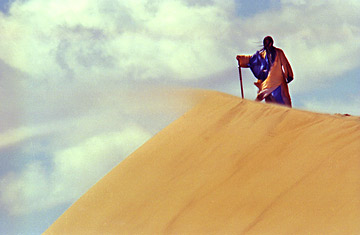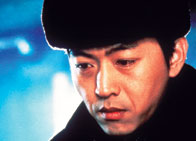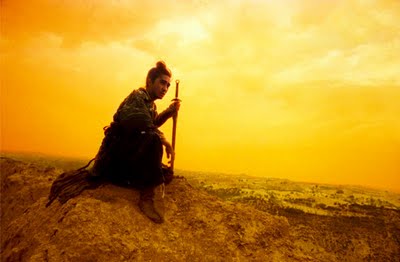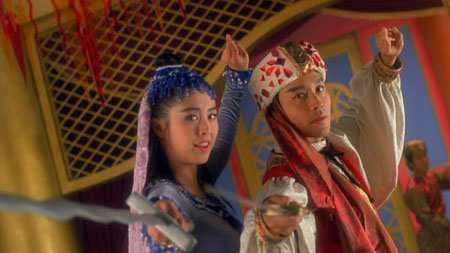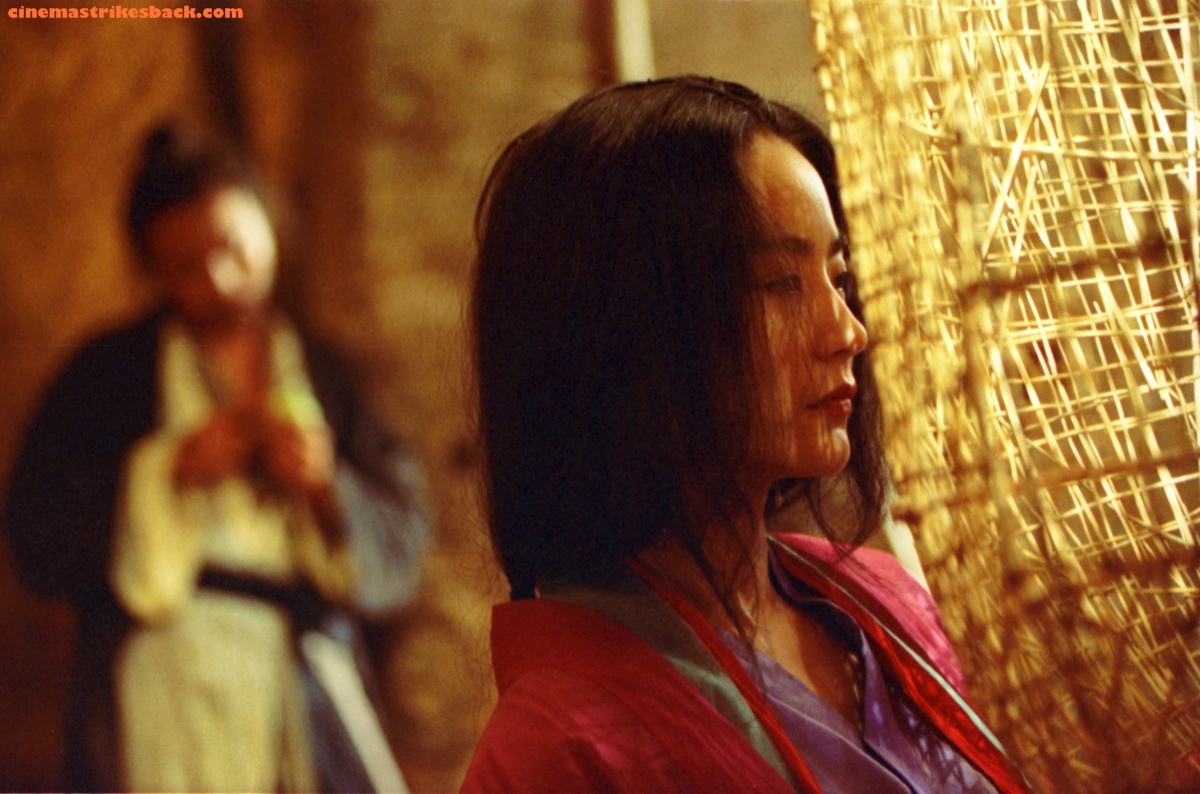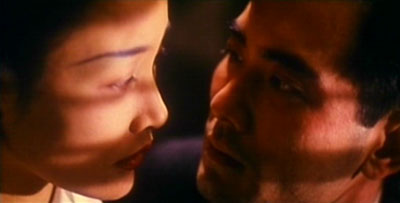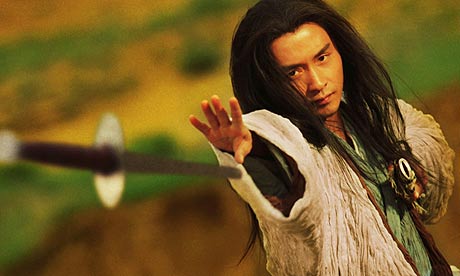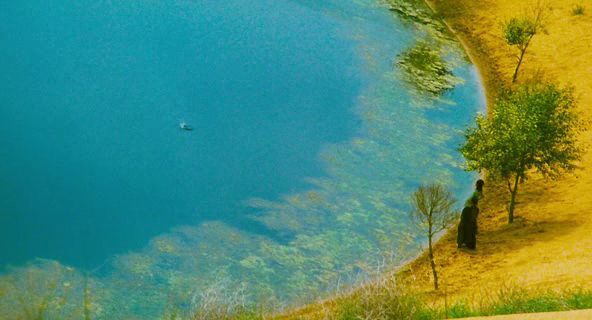From the Chicago Reader (March 10, 1995). — J.R.
Ashes of Time
Rating *** A must see
Directed and written by Wong Kar-wai
With Leslie Cheung, Tony Leung Kar-fai, Brigitte Lin Ching-hsia,Tony Leung Chiu-wai, Maggie Cheung, Jacky Cheung, and Karina Lau.
There’s no question that Chinese cinema is in a state of upheaval. On the mainland the government’s film bureau has introduced new legislation that would discourage foreign financing of local production, and it’s blacklisted many of the best (and best-known) independent filmmakers and video artists, including Tian Zhuangzhuang (The Blue Kite), Zhang Yimou (To Live), and Zhang Yuan (Mama). Meanwhile the market for Chinese movies in both Taiwan and Hong Kong has taken a nosedive. Last summer, for the first time in Hong Kong in three decades, Hollywood movies outgrossed locally made movies (with Speed and The Flintstones leading the pack). And according to Asian film specialist Tony Rayns, most of the best Taiwanese directors are seeking new sources of financing and exploring foreign markets now that their local audiences are drifting away. Even the most publicized romance in the Chinese film world, the one between director Zhang Yimou and star Gong Li, is on the rocks.
Nevertheless, some exciting changes in content and style are occurring in Chinese films, judging from the several I caught at festivals last year. Part of the difference undoubtedly derives from increased cooperation between different parts of the Chinese-speaking world as Hong Kong’s 1997 reversion to the mainland approaches; another part can probably be attributed to a growing awareness of Chinese cinema outside the Chinese-speaking world. Last month I saw three surprising Chinese films in Berlin. Li Shaohong’s Blush, which focuses sympathetically on the difficult fates of two former Shanghai prostitutes and one of their wealthy clients just after the civil war, is a mainland China/Hong Kong coproduction. Stanley Kwan’s no less feminist (but much more erotic) Red Rose White Rose — an interesting if somewhat disappointing follow-up to his extraordinary Actress — is a Hong Kong/Taiwanese coproduction. And Yim Ho’s The Day the Sun Turned Cold — a gripping murder-mystery melodrama from Hong Kong that has already acquired a U.S. distributor, Kino International — is set and chiefly shot in mainland China.
In fact Stanley Kwan and Yim Ho are two of my three favorite Hong Kong directors (Yim Ho is perhaps best known for Homecoming and his work on King of Chess, a feature completed by Tsui Hark). The third is Wong Kar-wai, whose dazzling if sometimes bewildering fourth feature, Ashes of Time (1994), is playing at the Film Center on Saturday and Sunday. Budgeted at five and a half million dollars — a veritable fortune for a Hong Kong film — it has a lengthy and troubled production history: Wong started shooting in northern mainland China in 1992, suspended work when his all-star cast had to leave to meet other commitments, then resumed shooting in the summer of 1993. During that long hiatus Wong wrote, shot, and edited Chungking Express (1994), and thanks to Quentin Tarantino this will be his first film to receive U.S. theatrical release. (Tarantino, recently granted his own subdivision at Miramax, is allowed to select a few foreign films a year for distribution, and Chungking Express was his first choice.)
Ashes of Time is neither the greatest nor the most accessible Wong film I’ve seen — Days of Being Wild (1991) is better, and Chungking Express is more accessible. But it’s certainly the wildest as well as the grandest in scale, and it probably bears greater witness to some of the recent changes in Chinese cinema. (I haven’t seen Wong’s first feature, the 1988 As Tears Go By, but according to J. Hoberman in the current issue of Premiere, it “successfully reworks the premise of Martin Scorsese’s Mean Streets.”)
After two viewings six months apart, I still can’t follow the entire plot of Ashes of Time, but I’m not sure that the plot matters a great deal; there’s so much going on visually in every shot, rhythmically in every sequence, and dramatically in every scene that I was never bored. I feel much the same indifference to plot watching the camp extravagance of Jeff Lau’s The Eagle Shooting Heroes [see photo below], a fantasy adventure featuring the same stars as the ones in Ashes of Time, based on the same four-volume novel by Jin Yong on which Ashes of Time was based, and made around the same time (the Film Center is also showing it twice this weekend). Certainly in The Eagle Shooting Heroes the story line is about as functional as the plots of most musicals, which serve as pretexts for various numbers. And the related story line in Ashes of Time, however more solemnly Wong treats it, still functions mainly as the occasion for his countless stylistic inventions. For Hong Kong audiences, who already know the stars and at least some of the plot better than I do, the story obviously means something more — but still less, I suspect, than the visual and rhythmic arabesques built around it.
Because my perception of Ashes of Time remains fragmented and partial, I’d like to take three different approaches to it: as a western, as a Hong Kong new wave film, and as part of Wong Kar-wai’s oeuvre. None of these approaches in itself is wholly satisfactory, but together I think they offer some clues about what makes the movie provocative and exciting.
Perhaps Ashes of Time should be regarded as an “eastern” rather than a western, with swords taking the place of guns and a camel or two thrown in with the horses. Set in an undefined period, the movie obviously owes a lot to Sergio Leone westerns, but this connection may confuse viewers as much as anchor them. Western reference points are a constant trap, a temptation for Westerners viewing Hong Kong movies — not necessarily because the influences aren’t there but because focusing on them makes the indigenous elements much more difficult to tease out and understand. It’s hard to avoid thinking of Kwan’s Actress and Red Rose White Rose or this film in relation to Josef von Sternberg, because their beautifully mottled and meshed patterns of light and shadow, smoky atmospheres, and labyrinthine, weblike spaces are so similar. But it’s possible that I’m actually responding to Chinese pictorial art and architecture. Though it’s likely that Kwan is familiar with Sternberg — and even likelier that Wong is familiar with Leone — such references provide only limited insight into these movies.
Both Wong and Leone use extreme close-ups and build very slowly to scenes of violence; they also tend to focus on hired killers, bloody vendettas, and the brooding isolation of the hero — in Ashes of Time he’s a once-celebrated horse thief (Leslie Cheung) from White Camel Mountain who establishes a desert inn and becomes an agent of hired killers. But Wong’s extremely elliptical, eclectic manner of displaying violence is worlds apart from Leone’s in A Fistful of Dollars or Once Upon a Time in the West. Wong’s violent interludes are most often brief riots of slurred or slow-motion action alternating unexpectedly with freeze-frames; these sequences, delivered so rapidly one can often barely perceive what’s happening, are obviously abstract versions of the action scenes in conventional martial-arts films (The Eagle Shooting Heroes included). Brilliantly executed, Wong’s peculiarly decentered violent sequences are actually more evocative of the battle scene in Orson Welles’s Chimes at Midnight than they are of Leone’s operatic showdowns, especially in the way they concentrate on ephemeral, oblique details rather than heroic spectacle. In fact they seem to indicate Wong’s desire to deconstruct the heroic ideals commonly associated with bloodshed — also Welles’s motivation. (Wong has said of Ashes of Time, “I tried to depart a little from the traditional martial arts genre. Instead of treating these characters as heroes, I wanted to treat them as common people, before they became heroes.”)
The rapidity of these sequences reminds me of an observation once made by German composer Karlheinz Stockhausen about the differences between Japanese and Western cultures in relation to time. He noted that a Japanese tea ceremony is both slower and faster than a similar procedure would be in the West — the endlessly protracted process of sipping the tea is followed by a quick gulping down of the last drops. Applying this observation to Japanese music and other cultural forms, Stockhausen identified a pattern that helps account for what Western listeners and viewers perceive as the extreme slowness of certain passages and the extreme rapidity of others (often sequences involving violence). Related principles seem operative in many Chinese films, and they clearly play a role in Ashes of Time.
Perhaps the most Leone-like aspect of this “eastern” is the campy score: an electronic pastiche of Ennio Morricone music complete with a male chorus that sounds on occasion like the Four Freshmen. But I’m told that this is one element of the film for which Wong can’t be held accountable. Reportedly his completed version of the film had no music at all — an unthinkable impertinence by commercial Hong Kong norms — and the producer hastily commissioned the present score and slapped it on.
There are many suggestive parallels between the French New Wave and the Hong Kong new wave: Stanley Kwan is interested in film history and influenced by certain Hollywood traditions, and Yim Ho can be regarded as the rough counterpart of John Frankenheimer in the 60s — that is, he’s a director influenced by the French New Wave who tends to be at the mercy of his scripts. Wong Kar-wai’s link to the French New Wave is largely a matter of his stylistic eclecticism and his youthful, energetic, and romantic treatment of contemporary urban life (apparent in both Days of Being Wild and Chungking Express). Significantly, the seemingly autobiographical Days of Being Wild is set in 1960, when Wong himself was only two years old, which is precisely the time when the French New Wave was taking off. (Hong Kong film critic Stephen Teo has noted that the film’s original title, A Fei Zhengxhuan, alludes to the Chinese title of Rebel Without a Cause: “‘A Fei’ is local Cantonese slang for unsavory youths and the full title may be interpreted as the life story of one.”) One might add, tentatively, that the taste in French New Wave films for foreign accents and unusual French dialects might be matched by the linguistic salads in Days of Being Wild and Chungking Express; the former includes dialogue in Cantonese, Mandarin, and Shanghainese.
Just as the French New Wave had one key cinematographer (Raoul Coutard — a resourceful, gifted technician who shot most of the early features of Jean-Luc Godard, Francois Truffaut, and Jacques Demy), the Hong Kong/Taiwanese new wave has its own pivotal director of photography, Christopher Doyle. Born in Australia, Doyle studied Chinese art history at the University of Maryland, became a sailor, and settled in Taiwan, where he became an apprentice to Chen Kun-hou, the cinematographer on Hou Hsiao-hsien’s early films. Since then he’s shot such features as Edward Yang’s That Day on the Beach, Kwan’s Red Rose White Rose [see photo below], and Wong’s Days of Being Wild, Ashes of Time, and Chungking Express. His remarkable work defines the Chinese new wave every bit as much as that of the directors who’ve hired him. (In Berlin last month he proudly announced that he regarded himself as a Chinese cinematographer, a description seconded by Kwan.)
We tend to think of the French New Wave and its contemporary derivatives as low-budget black-and-white cinema, but in fact the French New Wave also included many bigger-budget films intended to make incursions into the commercial mainstream — movies like Godard’s Contempt, Rivette’s The Nun, Truffaut’s Fahrenheit 451, Chabrol’s A double tour (also known as Leda and Web of Passion), and Skolimowski’s The Adventures of Gerard. All of Wong Kar-wai’s later features (and perhaps his first) belong to this second category. It’s often said of Days of Being Wild that, despite its enormous critical success in Hong Kong and Taiwan and its many festival prizes, it was a resounding flop at the box office because its all-star cast raised genre expectations that weren’t met. (Wong originally planned to make it a two-part film, but the first feature fared so badly he was never able to find backing for the second; Tony Rayns has fancifully theorized that Ashes of Time employs elements of this lost project.) It’s possible, even probable, that for the same audience Ashes of Time also confounds genre expectations, but apparently not as badly; reportedly it enjoyed a moderately successful commercial run in Hong Kong last summer.
For all their thematic and stylistic differences, Wong’s three most recent features are plainly the work of the same artist. The slurred action scenes in Ashes of Time, for example, are just as evident in Days of Being Wild and Chungking Express — revved-up cadenzas and explosive interludes of exuberance (or desperation).
Days of Being Wild and Chungking Express are both episodic — closer to story collections than to novels — and even this movie, which unlike these two doesn’t derive from material originated by Wong, breaks up much of the story into discrete segments. (By Wong’s own account, what he mostly took from the novel is two characters who appear in the book only as old men; much of Ashes of Time is an extrapolation of the early lives of “Evil East” and “Poisonous West,” as the two are known in the original.) Ashes of Time, generally more radical in form than its two predecessors, is more conservative in its handling of offscreen narration: Days of Being Wild and Chungking Express are both narrated by several characters, each of whom picks up the narrative thread in a separate segment, whereas Ashes of Time has only one narrator throughout, the innkeeper.
The difference this makes in Wong’s art is considerable. In the kaleidoscopic earlier films every important character is generously accorded his or her perspective on part of the narrative, giving these films a novelistic density that’s rare in Hong Kong movies. Wong works overtime trying to give the innkeeper’s narration in Ashes of Time some of the thematic resonance found in the two earlier features, and occasionally he succeeds. As the title implies, he’s preoccupied here with the ravages of time and the burden of recollection — there’s a related obsession with clocks in Days of Being Wild, and Chungking Express recounts the separate stories of two young men both struggling to forget unhappy romantic relationships. In this film an important role is played by a magic wine that causes all who drink it to lose their memories. Indeed, it seems that the closer contemporary Chinese cinema comes to contemplating China’s future, the more filmmakers are preoccupied with rethinking and renegotiating troubled pockets in its past.

